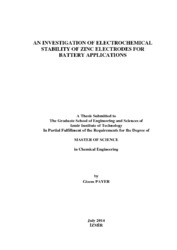Please use this identifier to cite or link to this item:
https://hdl.handle.net/11147/4227| Title: | An Investigation of Electrochemical Stability of Zinc Electrodes for Battery Applications | Other Titles: | Batarya Uygulamaları için Çinko Elektrotların Elektrokimyasal Kararlılığının İncelenmesi | Authors: | Payer, Gizem | Advisors: | Ebil, Özgenç Çiftçioğlu, Muhsin |
Keywords: | Zinc battery Electrochemical stability |
Publisher: | Izmir Institute of Technology | Abstract: | Energy is the most important and inevitable requirement for humankind. The increasing energy demand has been connected with technological advances and the population growth. One of the most serious problems of the world is to provide sustainable energy. New alternative energy sources and renewable energy technologies have become notable research subjects due to wide availability of renewable energy sources in the world. However, most renewable energy sources do not provide uninterrupted energy to consumers. An economic, efficient and reliable energy storage technology is desperately needed. Therefore, academic research has focused on improving the capacity of electrochemical energy storage technologies. The main goal of this study is the preparation and characterization of zinc electrodes for battery applications using different zinc oxide powders with various morphologies and additives. Zinc oxide powders were synthesized with chemical precipitation method under different conditions (precursors, temperatures and aging times) in order to investigate their effects on ZnO morphology and on the performance of nickel-zinc battery. It was found out that the initial morphology of ZnO powder was not crucial for the electrochemical performance. Nickel-Zinc batteries with zinc electrodes prepared from commercial ZnO powder had discharge capacities around 247 mAhg-1 and showed slightly better performance compared to nickel-zinc batteries with zinc electrodes prepared from ZnO powders synthesized via chemical precipitation method. It was also determined that zinc electrode morphology was greatly affected by battery additives (PVA and PEG) and charging current density. The effects of some selected electrode additives (Ca(OH)2, PbO and PEG) on battery performance were also investigated. Zinc electrode with all additives showed improved electrochemical properties, such as higher discharge capacity (322 mAhg-1) and utilization ratio (48.86 %.) | Description: | Thesis (Master)--Izmir Institute of Technology, Chemical Engineering, Izmir, 2014 Includes bibliographical references (leaves: 82-89) Text in English; Abstract: Turkish and English Full text release delayed at author's request until 2016.08.11 |
URI: | http://hdl.handle.net/11147/4227 |
| Appears in Collections: | Master Degree / Yüksek Lisans Tezleri |
Files in This Item:
| File | Description | Size | Format | |
|---|---|---|---|---|
| 10014440.pdf | MasterThesis | 4.43 MB | Adobe PDF |  View/Open |
CORE Recommender
Page view(s)
324
checked on Mar 10, 2025
Download(s)
208
checked on Mar 10, 2025
Google ScholarTM
Check
Items in GCRIS Repository are protected by copyright, with all rights reserved, unless otherwise indicated.